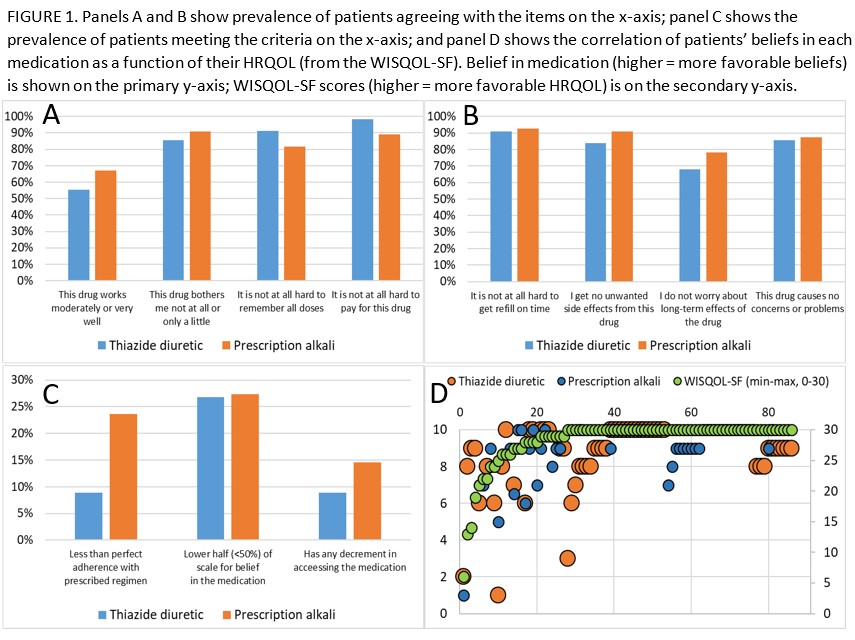Back
Poster, Podium & Video Sessions
Podium
PD05: Stone Disease: Medical & Dietary Therapy
PD05-02: Adherence and Medication Beliefs Amongst Patients Prescribed Thiazides and Alkali for Stone Prevention and Their Association with Stone Related Quality of Life
Friday, May 13, 2022
9:40 AM – 9:50 AM
Location: Room 252
Christopher Haas*, Shuang Li, Stephen Y. Nakada, Kristina L. Pennniston, Madison, WI

Christopher R. Haas, MD
University Of Wisconsin
Podium Presenter(s)
Introduction: The primary objective of this study was to compare patient’s adherence and beliefs on the efficacy of thiazide diuretics and alkalizing agents used in the prevention of recurrent stone formation. Secondarily, we hypothesized that higher belief in their medication’s efficacy would be positively correlated with increased stone-related quality of life.
Methods: The Basic Medication Questionnaire (BMQ) is a validated tool for evaluating patients’ beliefs about medicines and to screen for adherence and adherence barriers. We mailed surveys of the BMQ and Wisconsin Stone Quality of Life Short Form (WISQOL-SF) to patients prescribed either a thiazide diuretic or an alkalizing agent within our metabolic stone clinic. A composite score of the questions on the BMQ relating to beliefs and bother from medication was created (range 0-10, 10 = highest positive belief). We generated descriptive statistics to compare BMQ questions between thiazide diuretics and alkali and created a scatter plot to assess correlation between belief scores of medication type and WISQOL-SF scores.
Results: Of surveys mailed (n=243), we received responses from 91 patients (response rate 37%). Of these, patients were 42% female, 66±8.6 years of age, had a median of 3 lifetime stone events (mean 13.5), and stone disease onset a median of 12 years ago (mean 17.8). Non-responders were not different for gender or age. Of patients taking a thiazide, 55% believed the drug worked moderately or very well compared to 68% taking alkali, with no notable differences between drugs’ bother scores (figure 1A & B). Patients on alkali had a higher prevalence of less than perfect adherence vs. those on thiazides (figure 1C). Positive beliefs about both medications were correlated with WISQOL-SF scores (figure 1D).
Conclusions: The majority of patients had moderate to strong beliefs about drug efficacy of thiazides and alkali. Adherence with the prescriptive alkali regimen tended to be lower than for thiazides. As higher belief scores in the efficacy of medications are associated with higher stone-related quality of life scores, providers should strive to educate patients on the benefits, mechanisms, and side effects of thiazide diuretics and alkalinizing agents in order to maximize patients’ stone related quality of life.
Source of Funding: none

Methods: The Basic Medication Questionnaire (BMQ) is a validated tool for evaluating patients’ beliefs about medicines and to screen for adherence and adherence barriers. We mailed surveys of the BMQ and Wisconsin Stone Quality of Life Short Form (WISQOL-SF) to patients prescribed either a thiazide diuretic or an alkalizing agent within our metabolic stone clinic. A composite score of the questions on the BMQ relating to beliefs and bother from medication was created (range 0-10, 10 = highest positive belief). We generated descriptive statistics to compare BMQ questions between thiazide diuretics and alkali and created a scatter plot to assess correlation between belief scores of medication type and WISQOL-SF scores.
Results: Of surveys mailed (n=243), we received responses from 91 patients (response rate 37%). Of these, patients were 42% female, 66±8.6 years of age, had a median of 3 lifetime stone events (mean 13.5), and stone disease onset a median of 12 years ago (mean 17.8). Non-responders were not different for gender or age. Of patients taking a thiazide, 55% believed the drug worked moderately or very well compared to 68% taking alkali, with no notable differences between drugs’ bother scores (figure 1A & B). Patients on alkali had a higher prevalence of less than perfect adherence vs. those on thiazides (figure 1C). Positive beliefs about both medications were correlated with WISQOL-SF scores (figure 1D).
Conclusions: The majority of patients had moderate to strong beliefs about drug efficacy of thiazides and alkali. Adherence with the prescriptive alkali regimen tended to be lower than for thiazides. As higher belief scores in the efficacy of medications are associated with higher stone-related quality of life scores, providers should strive to educate patients on the benefits, mechanisms, and side effects of thiazide diuretics and alkalinizing agents in order to maximize patients’ stone related quality of life.
Source of Funding: none


.jpg)
.jpg)